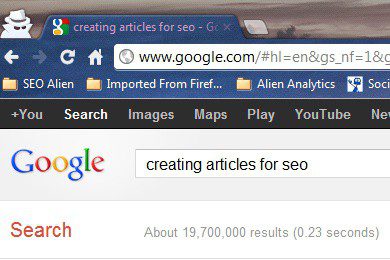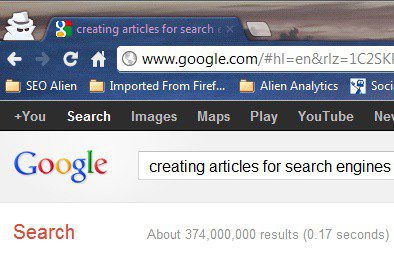 Their are several methods that will get you to the top of the Search Engines, but one of the simplest, most effective ways to get your marketing on the first page for popular, competitive searches is by using article marketing. However, their are a few things you can practice to get your posts not only to the top of the Search Engines, but also shared by others around Social Media to give it that 'viral' effect.
Their are several methods that will get you to the top of the Search Engines, but one of the simplest, most effective ways to get your marketing on the first page for popular, competitive searches is by using article marketing. However, their are a few things you can practice to get your posts not only to the top of the Search Engines, but also shared by others around Social Media to give it that 'viral' effect.
When writing an article, there are several things to keep in mind if you are looking to get on the top of searches and get more 'virability' from shares and likes. Here are several to think about.
Choose the Right Title!
The Title of your article is arguably the most important part of anything you do with your article. Not only is it what shows up on the Search Engines, but it should be close to what you think people would be typing in a search. If people search close to your exact title, their is a great chance that your article will show up near the top, if not #1.
Part of the art to creating a good title is combining all that with making it enticing enough for people to want to click it.
Research your Title for competitiveness before you post. You want your article Title to be competive, but not exactly the same as others that are already their.
For example, the name of this article is "Create Articles For Search and Share". Before I came up with that title I did a few searches around the subject of my article and found that:
For the Title "Creating Articles for SEO" their were several other articles that used almost that exact Title phrase, but more importantly, their was only about 19,700,000 similar articles with those words in it.

Then I did a few more searches like "Creating Articles For Search Engines". The competitiveness of that title was pretty good and I almost settled on it, it had about 374,000,000 competitive results. Now those results may differ depending on what location you are searching from, but the comparisons should still be pretty accurate.

I then did one more search for "Create Articles For Search and Share" and found that their was NOT ONE article on the first page of Google for that Title. The other reason for choosing that article title was it had about 1,580,000,000 (1.5 Billion!) results that has a variation of that title phrase in it.

Unique, Descriptive Descriptions.
When you post your article either to the Search Engines or to Social Media sites, their is always a place that you can add your description of the Article. Most Search Engines use a maximum of 160 chars for the description, other sites will vary, but I always follow the 160 max rule that Google has.
When posting your article to either Bookmarking sites or Social Media sites, do not use the same description on each one. "tweak" it a little bit on each one to allow that article to be indexed for not only different keyphrases, but to also to not look like a 'spammer'.
Do Not Keyword Stuff
One of the best ways to red flag Google that your article is nothing more than an attempt to write something to 'manipulate" search results is keyword stuffing. That is simply using the keyword in your article more that 2-3% of the time. If your article title, description and content of that article are both relative and unique, you will have no problems for that article 'popping' on the Search Engine for your title.
Do not use the Title you choose in your description, you can re-phrase it, but do not use it exact. That, as well, will red flag Google that something is up to no good.
Brand Your Article
Everyone of your articles should have your company logo and/or image within it. (Ours is below in our signature). This will create public awareness of your brand and then when more people see it and become familiar with it, they will begin to trust it, or at the very least, recognize it.
When I get out for public speaking, people may not know my name, but when I give them my card with that lil' blue alien, several people will go, "Oh, I know who you are!". Brand recognition is so important.
Write For Your Customer Base.
Knowing your audience is imperative. Understand this, your target market is:
- Not You
- Not Search Engines
- Not Everybody
So knowing this, when you write:
- Address their needs
- Target your visitors first, not the Search Engines
- Keep your articles focused on your subject.
Write for Relevance to Your Niche
Think of it this way, when you write, keep the articles relevant to: Your Site – The Search Engine – Target Market
Share Your Article with Popular Social Groups.
After your article is posted, you need to share it. LinkedIn for example allows you to join 50 groups. You should join these groups that are relative to your niche. Others will hopefully share them with their followers and comment on them, which in return, will give them "Google juice" and a touch of that 'vira-abiltiy". Do the same by posting on your Facebook biz page and Google+. Their are several other "micro-social sites" like delicious and digg, etc that you can share on as well, just be sure to tweak the title and description on each.
Do Not Resort to Black Hat Techniques
No matter how tempting and luering some of these black hat techniques are that will be bombarded on you from gurus and search marketing experts, don't do it. Google is doing everything in it's power to penalize anyone or any company that uses ‘unethical’ tactics such as, low quality link building, over-optimization of anchor text, Keyword stuffing and over-publication of poor quality content, created purely for Search Engines.
Think of what is out their when you do it right, think of what you will loose if you do it wrong.
In 2012:
- 88.1% of US users will browse and shop online.
- 83.9% of internet researchers will buy online at least once.
- 184.3 million online shoppers.
- 154.6 millions online buyers.
Do it Right and Here is the Result




.png)
